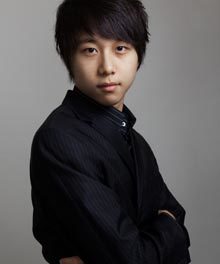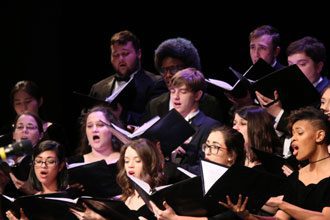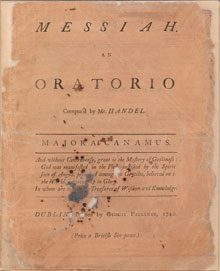 By Margaret Evans, Editor
By Margaret Evans, Editor
In April of 1742, George Frideric Handel’s Messiah 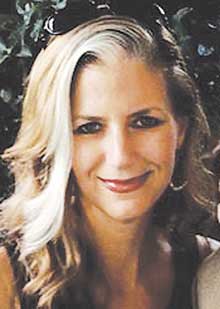 ignited the stage of Dublin’s Musick Hall, where a record-breaking 700 people had turned out for the superstar composer. (The ladies had been asked by management to wear “dresses without hoops, to make room for more company.”) From the first strains of the tenor’s opening lines – Comfort ye, comfort ye my people, saith your God – the massive audience sat spellbound, completely enthralled. The following year, Messiah made its London debut, where legend has it the “Hallelujah” chorus moved King George II to his feet.
ignited the stage of Dublin’s Musick Hall, where a record-breaking 700 people had turned out for the superstar composer. (The ladies had been asked by management to wear “dresses without hoops, to make room for more company.”) From the first strains of the tenor’s opening lines – Comfort ye, comfort ye my people, saith your God – the massive audience sat spellbound, completely enthralled. The following year, Messiah made its London debut, where legend has it the “Hallelujah” chorus moved King George II to his feet.
More than two centuries later, a little girl was growing up in Alabama, the child of parents who sang in the community theatre and the church choir. They had many daughters, and their house was always filled with music. The little girl knew her Bach and Handel as well as she knew her Rodgers & Hammerstein, and she loved it all, but especially Messiah. The oratorio was strange and marvelous to her ears, difficult to sing but impossible not to as it rang through her house at Christmas and Easter and plenty of other times, too.
Three decades passed. Now that little girl was a middle-aged woman sitting with her own little girl on the front pew at First Presbyterian Church of Beaufort – it wasn’t her church; she didn’t have one – listening to the choir perform the Christmas part of Handel’s Messiah, and quietly weeping. As the power of that music washed over her – at once familiar and absolutely new – she found something she’d lost more than 20 years earlier, after leaving home for college. She wasn’t sure what to call it exactly – that something she’d lost and found – but when the service ended, she joined the choir . . . and later, the church.
That little girl, that woman, was me. And now it’s almost a decade later, and Handel’s Messiah has once again entered my life like a bright, beatific thunderbolt.
On December 5th, the Sea Island Chamber Singers will perform the Christmas part of Messiah at the USCB Center for the Arts . . . and I’ll be with them. Hallelujah! (Yes, we’re throwing in that perennial favorite, too, though it’s officially an Easter chorus.)
We’ve been practicing every Sunday night for the past couple of months, which merely underscores my dedication. Traditionally, Sunday’s when I call my mother in Alabama; we both pour ourselves a big glass of wine and settle in for a lengthy chat. While I’m catching up with Mom, Jeff’s usually making something yummy for dinner – with our schedules, it’s one of the few nights we can all eat together – and then we unwind with our daughter before the school/work week is upon us again. In short, I treasure my Sunday nights. I wouldn’t give them up for just anybody.
But George F. Handel’s not just anybody. And neither is Charles D. Frost. Charlie’s the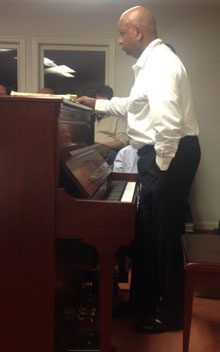 director of the Chamber Singers – when he’s not working his “day job” as minister of music at Sea Island Presbyterian Church – and he’s a delightful force to be reckoned with. If Sunday night rehearsals are hard for me, they’re ten times harder for Charlie. (Music directors at large, thriving churches tend to be pretty busy on Sundays.) But he always seems genuinely happy to be there.
director of the Chamber Singers – when he’s not working his “day job” as minister of music at Sea Island Presbyterian Church – and he’s a delightful force to be reckoned with. If Sunday night rehearsals are hard for me, they’re ten times harder for Charlie. (Music directors at large, thriving churches tend to be pretty busy on Sundays.) But he always seems genuinely happy to be there.
Like mine, Charlie’s Messiah memories go way back. “When I was in elementary school, my mother and I went to see The Greatest Story Ever Told,” he says. “At the end of the movie, the choir sang Handel’s ‘Hallelujah’ from Messiah. Later I told my mother that I loved that piece and wanted to conduct it someday. She said that I would.”
And so he did. Again and again and again. When Charlie was a freshman at Westminster Choir College in Princeton, NJ, his choir performed Messiah, and he developed a “strong love” for the work. Every Christmas, the college would hold a Messiah Sing-Along for the whole Princeton community, selecting a senior – by audition – to direct. “They selected me,” says Charlie, “and it was quite an honor. Since this was a music school, the Sing-Along was more like a performance.”
Since then, Charlie has conducted more Messiah performances and Sing-Alongs than he can count. “My own personal tradition is to listen to the entire Messiah every Christmas and Easter,” he says. “I find this work to be a most moving and worshipful experience.”
In keeping with its namesake, Messiah feels both rooted and transcendent – deeply embedded in Western history, but beyond it, too, as only art (and divinity) can be. It’s hard to imagine a time before Messiah, or a time when it ceases to be performed. To sing it is to take your small place in a long and hallowed tradition – stretching backward in time and upward to eternity – and, to me, it’s as humbling as it is thrilling.
Soprano soloist Katie McAllister says Messiah is the first oratorio she ever learned – 33 years ago. “This work is more moving and significant to me than all of the operas and other classical music I have performed put together,” she says. “Handel had a monstrous talent for creating memorable melodies with often intricate chord structures . . . But my undying love for this masterpiece is primarily based on the fact that it glorifies the Lord. What greater words were ever written than those in the New Testament?”
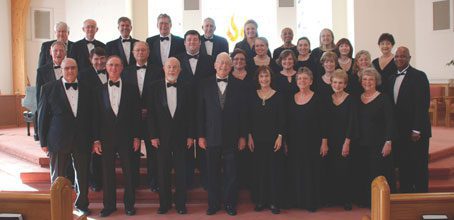
Messiah is a “religious experience” for alto Karen Ayers, too, who first sang it in college, in 1968. “It is one of the times I feel closest to God,” she says, “usually feeling goose bumps and weak in the knees, as well.” Soprano Karleen Hughes remembers singing it in college, too, and she loves “the feeling of awe that comes with singing such a valuable piece of musical history.” Alto Judy Copeland started singing Messiah in high school, and says, “Handel’s soaring rendition of scripture set to music is a reaffirmation of the gift and the promise given to us in the birth of the Messiah. It’s exhilarating for both the performers and the audience!”
Retired funeral director (and bass) Chick Dyckman has a different perspective, and speaks of the comforting/healing properties of Messiah. “I found that many families wanted some Messiah pieces played during funeral services for their loved ones,” he says. “These families found the music uplifting and distinctly different from the more common hymns traditionally played.”
Like conductor Charlie Frost, Beaufort High School music teacher Jordan Plair, our other soprano soloist, says she learns something new every time she approaches the oratorio. “As a teacher and a performer, I love Messiah.”
But trying to explain “what’s so great” about Handel’s Messiah is a bit like trying to explain what’s so great about a perfect winter sunset or Chartres Cathedral, the aurora borealis or a painted bunting on a branch, the Pieta or a newborn baby. Words simply fail. So I’ll stop wasting them and just invite you to come see – and hear – for yourself on Saturday, December 5th. We’re doing two performances, so there should be plenty of room for everybody. But just to be on the safe side . . . no hoop skirts, ladies.
The Sea Island Chamber Singers & Guests will perform the Christmas part of Handel’s Messiah – accompanied by an orchestra – on Saturday, December 5th at USCB Center for the Arts at 3 pm and 7 pm. For tickets, visit www.uscbcenterforthearts.com

